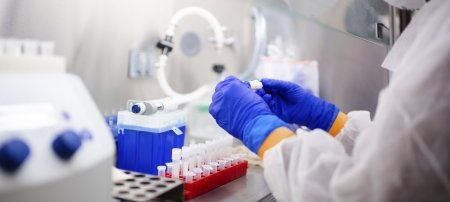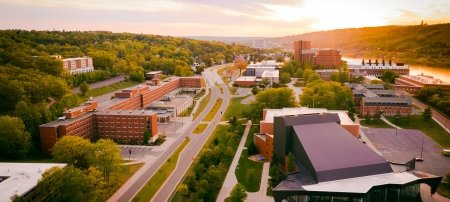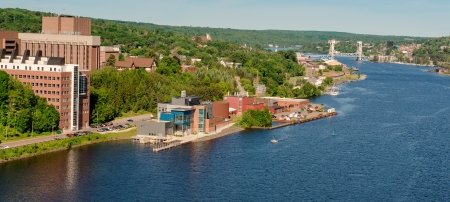The times are unprecedented, uncertain, and difficult. Caution is abundant. Everyone rose to the challenge. We are all in this together. And hindsight is 2020.
What can we say about keeping the University running during a pandemic that won’t sound like a cliché?
Nothing, honestly. The last few semesters have been tough—and it’s not over. And, it’s not just us. While the Keweenaw may be at the ends of the earth, Michigan Tech’s community does not live in a vacuum. Quarantine, political tension, protests, remote instruction, curbside pickup, nasopharyngeal swabs—everyone has been and continues to deal with it all.
Let’s take a moment to appreciate that. Everyone has been and continues to deal with it all. Some days, showering regularly and putting on pants deserves a trophy. No one is handing them out, of course, but it doesn’t mean we don’t recognize the effort (and appreciate your good hygiene—thanks).
No one is going to hand Michigan Tech a trophy for our accomplishments either. Besides, we still have a lot of work to do. But we want to tell you about what we have done because you deserve to know and there are many people who deserve to be thanked.
We’d keep you here through the New Year listing everyone’s individual names and heroic deeds, so we’re going to focus on major events and adaptations as they unfolded through the spring, summer, and fall. But this story is not The End. We are living history, and the Michigan Tech Archives is busy documenting campus experiences, so stay tuned (which is easy to do if you subscribe to our weekly news update).
The Early Days
The World Health Organization declared COVID-19 a pandemic on March 11. After the first furious, panicky moments of sh*t, sh*t, sh*t, sh*t, the higher ed world stepped up and got to work.
"The Michigan Tech community did what it does best. Take a deep breath, take stock, solve for x, repeat."
That meant shifting to remote instruction no later than Wednesday, March 18. The timeline was emailed out March 13, the Friday of spring break, meaning all faculty, students, and staff had five days to make it happen.
Michigan Tech was not alone. Higher ed journalists started a public Google Sheet tracking campus closures: Within three days, hundreds of colleges and universities announced they were going remote. There was a big splash when Harvard asked all students to leave campus and the education community confronted how many students had nowhere to go. Similar challenges arose with access to food and access to decent internet. Furloughs and layoffs hit campuses. While buildings, labs, cafés, sidewalks, and malls emptied, the peanut gallery filled up. People wondered if online education would finally have its day, if the value of higher education could handle a virtual mirror, if the whole system would combust.
COVID-19 Task Forces
The President’s Council formed a handful of COVID-19 task forces to tackle impacted areas:
- Academics and research
- Facilities and dining
- Finance and HR
- Health and medical
- Students and residential life
No one chose to be upended into this bottomless dumpster fire. But when life hands you garbage, you engineer that crap into a mobile sterilization oven—and you make sure you hammer out the design of this and other lifeboats alongside the technical communicators, social scientists, mathematicians, librarians, wastewater engineers, and physicist-entrepreneurs in your community. Yes, Michigan Tech lost people, teaching was insane, and learning was hard. But thanks to the task forces, instructors, students, parents, and staff, the campus community flamed through spring semester and survived mostly intact.
Here’s a glimpse of what adaptation looked like. The University Senate met over Zoom. The William G. Jackson Center for Teaching and Learning coached first-time online instructors and hosted weekly Zoom discussions with the IDEA Hub to talk shop. Counseling Services—now the Center for Student Mental Health and Well-being—jumped to telehealth appointments. Information Technology rushed to produce remote access guides and help instructors set up technology at home. We also wouldn’t be here without the staff in Facilities and Dining Services, who overhauled everything from how we use elevators to classroom cleaning to serving take-out food.
Dog Days of Summer
The heat and speed of summer would not have been possible without some very cold, very long days in the spring.
One group braved the cold to build a portable sanitizing unit for personal protective equipment (PPE) in a refrigerated shipping container dubbed the Mobile Thermal Utility (MTU) Sanitizer. Another crew took a biomedical engineering teaching lab and within six weeks turned it into a medical-grade COVID-19 testing facility, which has run more than 20,000 tests so far. Researchers began preliminary tests to track viral traces in wastewater. The Great Lakes Research Center, which now hosts the COVID-19 testing facility, also made sure pandemic delays did not stop research and monitoring on the big lake. Engineers got to work with medical doctors and makers around the world on open-source designs for 3D-printed respiratory tech.
Oh, yeah. And graduation happened. Class of 2020: You have already gone down in history.
Remote instruction continued over the summer to give the campus community time to figure out how in-person instruction would work. That’s where MTU Flex came in.
MTU Flex began as the University's game plan for the fall 2020 semester. Its premise? That we would be ready to respond to disruptions caused by COVID-19, such as financial changes, a need to care for ill relatives or roommates, or a lack of reliable internet. (And, to assist individuals facing situational changes. The MTU Flex website advised students to stay in touch with mtuflex@mtu.edu, and keep their instructors, student services staff, advisers, and mentors aware of the challenges they faced.)

Tour the COVID-19 Testing Lab
Michigan Tech is receiving and testing patient samples from local hospitals. The safety of our community and lab workers is top priority. Here is how we ensure accurate and fast test results so that our health care workers can do their jobs.

MTU Flex: Be Smart Do Your Part
MTU Flex is Michigan Tech's plan to return to campus this fall. But, we need your help. Learn what you can do to be smart, and do your part, to keep our campus and community safe and healthy.
Summer went by quickly. Alumni Reunion kicked off virtually in early August. The Health and Safety Levels rolled out and surveillance testing got underway with athletes first. The College of Engineering ran weekly webinars called HuskyBites. Social science professors and students dug into physically distanced Field School. The Rozsa Center for the Performing Arts installed special cameras and mics for virtual events.
Then first-year students arrived for Orientation Week on August 22 and classes resumed a few days early on August 27.
Waiting for the Other Foot to Fall
We'd be lying if we said that back in August we thought everything was going to be hunky-dory. You saw the news, we saw the news—everyone was watching and waiting to see how college campuses and their home communities would deal with big influxes of people who like to party coming in from all over the country.
Let’s Talk Testing
Preventing outbreaks means surveillance testing. Michigan Tech invested in a testing program led by a campus epidemiologist to ensure ongoing tests and contact tracing would detect outbreaks before they could take off on campus. As Vice President for Research David Reed put it: “A lot of schools are doing testing initially and then only symptomatic testing after that, which won’t allow them to see how it changes prevalence in the population day to day and week to week, which we will be seeing.”
And, Michigan Tech students, you pulled through. You pulled on your face coverings, you pulled on deep reserves of patience and determination—which faculty and staff tapped into as well—and within three weeks of classes resuming, the campus number of cases leveled off and declined. We weren’t surprised by the initial cases, and we had a robust campus plan to handle them, but Michigan Tech is part of a broader community. After students arrived, big Labor Day parties rocked on, the Keweenaw entertained more tourists than we’ve ever seen, and our local haunts saw a lot of maskless foot traffic. Like other rural regions in the country, we watched our housing market go nuts and noticed a lot of out-of-state plates and folks looking to escape the pandemic. Unfortunately, even as campus cases declined, community cases did not.
Houghton is our home, the Keweenaw is our community. So on September 25, the campus went to Health and Safety Level Four and lecture classes went remote while many lab courses, research, and essential operations continued in person. There was less disruption than in the spring thanks to the thoughtful and nimble planning of instructors, departments, learning centers, and support staff, including the Van Pelt and Opie Library, Waino Wahtera Center for Student Success and other student services, the Graduate School, Dining Services, and Facilities.
"The next time you see Facilities staff, lab managers, instructors, and others in high-risk jobs on our campus—thank them."
On Wednesday, November 18, the campus then shifted to Health and Safety Level Five in response to an emergency order issued by the Michigan Department of Health and Human Services, and all instruction went remote. Again, our campus community did everything humanly possible to slow the spread and follow safety guidelines. We got so close to being able to hold finals in person. But just as Michigan Tech is part of Houghton, we are also part of Michigan, the Midwest, the United States, and the world.
Bird’s Eye View
We are still in the thick of it. It’s a balancing act. We all are pulled in too many directions. We want to dig in our heels, open our minds, run and hide, pivot, and throw all this spaghetti on a wall.

It's hard to talk about history when we're living it. There are not yet words. The COVID-19 pandemic is a collective experience that's also deeply personal. Thanks to 2020, none of us can take breathing or blue skies for granted; we cannot ignore the impacts of our individual actions or the immensity of a system’s inertia. And we do not know when or how this pandemic will end. We're left to wonder: If change is the only constant, then how do we make wise choices and move forward?
Maybe we can’t. Maybe a higher education teaches us that we can’t move higher than the present moment. We can only be here, right now—we are only human. And to be human is to hope for a brighter future. So, do what Huskies do best. Take a deep breath, take stock, solve for x, repeat.
Not everything can be solved. Not everything will be fixed. But to refuse to try and make this world a better place is not an option for Michigan Tech. Take many deep breaths. Find gratitude, especially when it feels lost.
Michigan Technological University is an R1 public research university founded in 1885 in Houghton, and is home to nearly 7,500 students from more than 60 countries around the world. Consistently ranked among the best universities in the country for return on investment, Michigan's flagship technological university offers more than 185 undergraduate and graduate degree programs in science and technology, engineering, computing, forestry, business, health professions, humanities, mathematics, social sciences, and the arts. The rural campus is situated just miles from Lake Superior in Michigan's Upper Peninsula, offering year-round opportunities for outdoor adventure.














